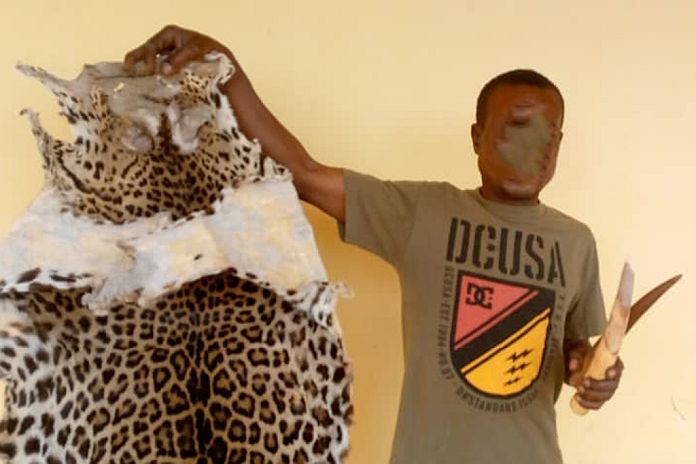SINGAPORE – An eight-week INTERPOL operation against wildlife crime and trafficking resulted in arrests and seizures across Asia and Africa.
Codenamed Golden Strike, the operation – which ended late last year – targeted the criminals and networks smuggling wildlife protected under the Convention on International Trade in Endangered Species of Wild Fauna and Flora (CITES) from Africa to Asia.
During the preoperational phase, countries worked together to identify INTERPOL-wanted fugitives known to travel frequently between Africa, Asia, the US and France, and who were wanted for their involvement in trafficking ivory, rhino horn, pangolin and tiger parts between the two continents.
Intelligence shared between the 23 participating countries ahead of operations enabled investigators to target emerging wildlife trafficking routes, with officers conducting inspections at roadblocks and land, sea and airport border points throughout the August-September tactical phase.
“The world’s fourth-largest illegal trade – wildlife and forestry crime – goes hand in hand with tax evasion, corruption, money laundering and even murder, with organized crime groups using the same routes to smuggle protected wildlife as they do people, weapons, drugs and other illegal products,” said Ilana de Wild, Interpol’s director of organized and emerging crime.
“Strong, coordinated responses such as operation Golden Strike are needed to address the activities of transnational organized crime groups involved in wildlife crime and to disrupt illegal trade chains across range, transit and destination states,” added Mrs de Wild.
Exceptional outcome
Although results are still coming in, the operation has so far seen seizures of several thousand wildlife products and the identification of some 100 suspects across 23 countries, triggering worldwide arrests and further investigations linked to wildlife trafficking.
A sample of seizures so far include:
- 1,202 ivory pieces weighing more than four tonnes
- 423 kg and 78 scales of pangolin species
- 50 rhino horns weighing 72 kg
- 46 kg totoaba bladders
- More than 3,785 pieces and 52 kg of mollusks
- 42 shark teeth
- 33 red corals
- 1336 other CITES protected species
- Live specimens including:
- 3 turtles and tortoises
- More than 120 birds
“Operation Golden Strike has provided a platform for the participating countries to take action in synchronicity, signaling the strong resolution of police authorities in combating such crimes,” said Duan Daqi, head of Interpol’s National Central Bureau in Beijing. Operation Golden Strike is funded by the government of China.
Emerging trends
Illustrating that traditional routes continue to be used by the organized crime groups behind wildlife trafficking between Africa and Asia, Malaysia authorities seized 50 rhino horns arriving illegally from Mozambique.
Likewise, international police cooperation between South Africa and Malaysia saw the arrest and prosecution of two suspects smuggling 45kg of rhino horns between the two continents.
Qatari authorities seized 10 kg of rhino horns from Mozambique bound for Vietnam, illustrating how wildlife products are increasingly transiting the Middle East countries on their way to Asia.
Operations also saw an increase in pan African trafficking, such as a seizure in the Democratic Republic of Congo of 50 kg of elephant tusks and 60 grey parrots bound for Uganda.
With pandemic confinement and travel restrictions over the past 18 months forcing wildlife criminals to shift from physical to digital wildlife markets, investigations saw an increase in wildlife crime committed over e-commerce sites, social media platforms and WhatsApp groups.
As a result, Thailand closed down 12 sites and 20 are under investigation.
Results also highlighted an increase in the use of birdcages to conceal and smuggle ivory, as witnessed by Singaporean Immigration and Checks Authority who seized a birdcage consignment containing 256 concealed ivory pieces.
Less than a month later, they intercepted a similar shipment containing 184 ivory pieces also concealed in birdcages.
Intelligence gathered during the operation and entered into INTERPOL’s wide range of police databases has triggered associated investigations ongoing in other parts of the world, particularly in relation to cyber-enabled wildlife cases.
Further arrests and prosecutions are anticipated as ongoing global investigations progress worldwide.
Participating countries included Botswana, Cambodia, Cameroon, Central African Republic, Congo DRC, China (including Hong Kong), Gabon, Indonesia, Kenya, Laos, Madagascar, Malawi, Malaysia, Nepal, Nigeria, Philippines, Singapore, South Africa, Tanzania, Thailand, Uganda, Vietnam, Zimbabwe.
INTERPOL’s environmental security activities are all externally funded and dependent on sustainable partnerships. ENS works in close collaboration with governmental, non-governmental and international organizations to disrupt transnational organized criminal groups involved in environmental crime. These partners also help us to provide our member countries with technical and logistical support.





